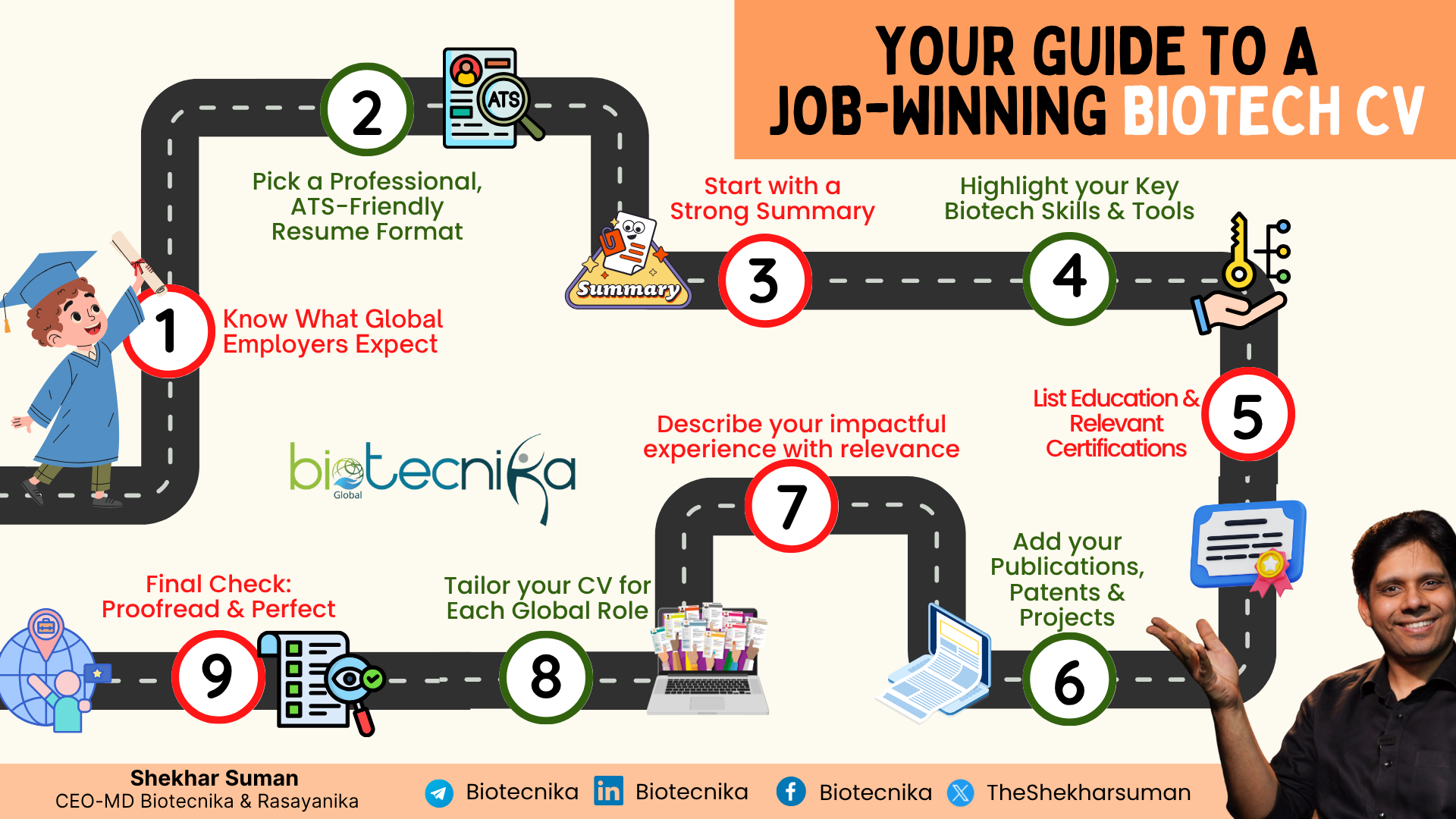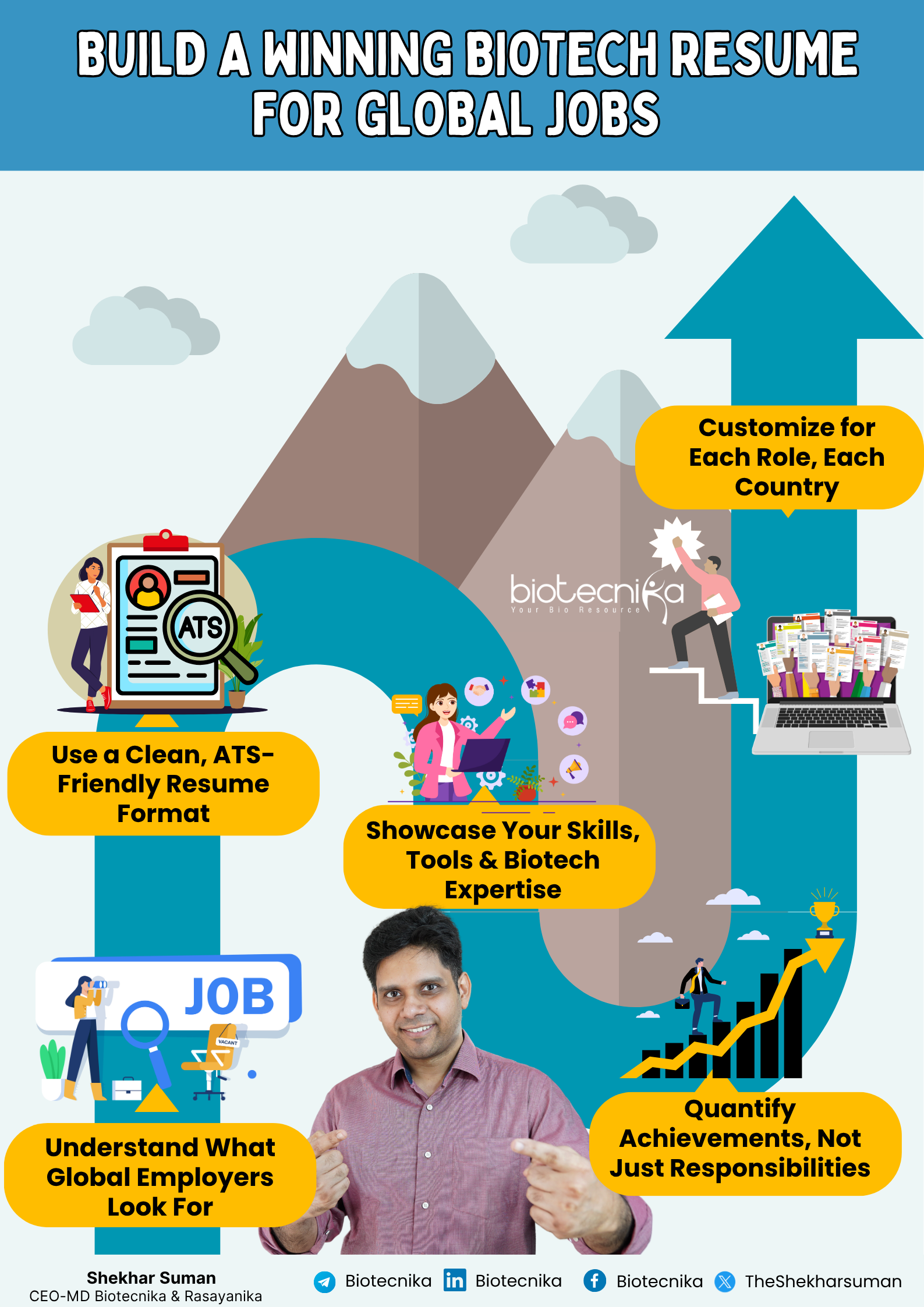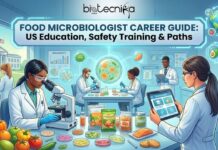How to Build a Winning Biotech Resume for Freshers for Global Job Applications
A hiring manager in Germany opens 64 resumes before lunch and selects one. One stands out because it is not the longest or attractive, but the clearest. Many talented biotech professionals miss out on global opportunities, not because they lack the skills, but because their resumes fail to showcase their skills properly.
“Recruiters Are Not Reading Your Resume. They are Scanning It Like a PCR Machine.”
Biotech Resume for Freshers is a story of every biotech innovation, adaptability, and international readiness. It is a kind of resume that helps you take your first step in landing an international job. Here is the guide in which you will learn how to craft a resume that communicates science, results, and global potential in a single document.
Are you ready to book your tickets to fly to your favourite University? Read until the end to know a few untold tips and tricks:
1. Understanding Global Expectations for a Biotech Resume for Freshers
Biotech recruiters from other countries look for sound technical knowledge and techniques beyond degrees. They assess how you can communicate your value. Here are a few things that they expect:
- Results-focused work: Recruiters want to know what impact you made, not just what you did.
- ATS-optimized structure: Many companies use Applicant Tracking Systems (ATS), so formatting and keywords matter.
- The words you use matter: Terminology, formatting norms, and expectations can vary between regions (e.g., GPA vs. CGPA, CV vs. resume).
- Professional tone: Keep it concise, formal, and internationally readable; avoid overly technical or specific language of the country.
2. Biotech Resume for Freshers That Works the Best
For global biotech applications, a clean, modern, and universally accepted format is essential. The following are important in a perfect resume:
- Header: Include name, professional email, LinkedIn URL, and your phone number with country code.
- Summary/Objective: 3–4 lines explaining your core strengths and career aspirations.
- Education: Include your degree(s), institutions, and completion dates. If applying abroad, consider explaining grading systems (e.g., 8.5/10 CGPA = First Class).
- Skills: Separate sections for technical skills (e.g., PCR, HPLC, CRISPR) and soft skills (e.g., project management, scientific writing).
- Professional Experience: List your roles in reverse chronological order. Use bullet points with action verbs and quantifiable outcomes.
- Publications/Certifications/Projects: Include relevant ones only with proper explanation. Don’t overload.
3. Writing a Powerful Professional Summary
The summary is the most critical part while designing a biotech resume for freshers. It acts as your 10-second elevator pitch to recruiters worldwide. It should answer:
- Who are you professionally?
- What is your domain expertise?
- What is your value in 2–3 sentences?
Example:
Science enthusiast with 2+ years of experience in microbial techniques, assay development, and CRISPR-based screening. Proven track record of optimizing workflows and contributing to peer-reviewed publications. Seeking international opportunities in antimicrobial resistance research.
4. Education and Certifications
For resumes that you use for global applications, your education section should include:
- Title of the degree and specialization
- University name and location
- Dates attended/graduated (month/year)
- Optional: CGPA (with equivalent format if necessary), honors, thesis title
Certifications to Include:
- GCP, GLP, ICH-GCP, Regulatory Affairs courses
- Online credentials from the platform where the course was completed (especially if from global universities or platforms)
Make sure the certifications are aligned with the industry and are recent
5. How to Showcase Biotech Skills and Tools in a Biotech Resume for Freshers
It is important to get hands-on experience with various biotech skills and tools. It is more important to showcase it on your Resume.
a) Technical Skills
- List instruments (e.g., GC-MS, ELISA), techniques (e.g., Western blotting, NGS), and software (e.g., GraphPad, R, Python).
- Use bullet points, recruiters choose quick scanning over slow reading.
b) Soft Skills
- Scientific communication, analytical thinking, teamwork, data interpretation, and protocol optimization.
Pro Tip: Align your skill list with the job description. Use exact terms from global biotech job postings.
6. Describing Experience with Impact
Don’t just list the experience and work done; highlight the impact and outcomes. Use action verbs and quantify them wherever possible.
How not to do:
- Conducted PCR and gel electrophoresis.
How to do:
- Performed high-throughput PCR analysis for infectious disease screening, increasing diagnostic efficiency by 35%.
Additional tip: Include internships, research projects, or remote collaborations demonstrating international relevance or adaptability.
7. Publications, Patents, and Projects
A Biotech Resume for Freshers usually does not have this section. But if you have worked in a research publication, this section can give you an upper hand. But don’t add too much and make it clumsy; add what is required.
- List the top 3–5 publications with full citation style.
- Mention if published in high-impact journals.
- For patents, list registration details and co-inventors.
- Include standout academic or industrial projects, especially if they led to innovations or collaborations.
8. Tailoring Your Resume for Global Roles
With one resume, you cannot apply for all the jobs. Each job role, description, and company requires a tailor-made resume. Customize for each job and region:
- Use keywords from the job description, especially technical terms.
- Adapt formatting – US companies expect a 1-page resume; the EU may accept 2 pages.
- Localize achievements – highlight global collaborations, remote work, or cross-cultural teams.
- Avoid region-specific acronyms unless explained (e.g., explain AICTE, DBT, or DST if used).
Bonus Tip: Include a brief “Technical Summary” section for quick review by global hiring platforms.
9. Common Mistakes to Avoid in a Biotech Resume for Freshers
Anyone can miss out on minute details and often lose opportunities due to avoidable resume errors like:
- Too academic: Avoid too specific details like every conference attended unless it is relevant.
- Generic summaries: Tailor your summary, don’t copy-paste.
- No metrics: Lack of measurable outcomes weakens the impact.
- Inconsistent formatting: Fonts, spacing, bullet styles, everything must be kept the same, clean, and professional throughout your resume.
- No LinkedIn link: Always include your updated LinkedIn profile; recruiters will check it. But don’t add the link to your profile.
A biotech resume for global job applications is more than a document; it is your pitch to the world. It needs to communicate your scientific value in a format that speaks to international recruiters, passes ATS scans, and makes a lasting impression.
The recruiter has never seen you or met you in person. The only way to show them who you are is with your resume. With the right structure, language, and mindset, your resume can open doors far beyond your home country and take your biotech career to the world stage.
So, before you send your next job application, ask yourself: Does my resume reflect the global scientist I want to become or the student I used to be?
As this article ends, it is time to upgrade, reframe, and let your resume become the bridge between your talent and the world’s opportunities.








